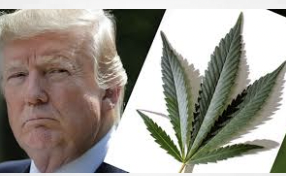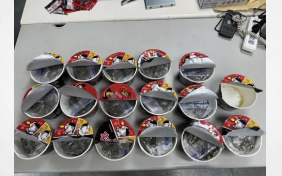This is FRESH AIR. I’m Terry Gross. When states started legalizing marijuana, one of the hopes was that it would cut down on crime because people could buy it legally from licensed sellers. But in some states, including Oklahoma, legalization inadvertently helped organized crime, especially the Chinese mafia, exploit new opportunities. Chinese organized crime has come to dominate much of the illicit marijuana trade in the nation, from California to Maine, according to a new series of investigative reports by a team of four journalists from two nonprofit news organizations, ProPublica and the Oklahoma-based The Frontier.
My guest, Sebastian Rotella, is the lead reporter on this series. For several years, he’s been investigating Chinese organized crime in the U.S., Europe and Latin America. He’s reported on the connection between Chinese organized crime and China’s authoritarian government and how that relationship is helping China expand its influence and power around the world. Rotella worked for almost 23 years for the Los Angeles Times before joining ProPublica in 2010. He covers international security issues, including terrorism, intelligence, organized crime, human rights, and migration.
Part one of the new series focuses on Chinese organized crime’s grip on America’s illegal marijuana market, which has led to increases in other crimes, including money laundering. Part one was published earlier this month. Part two emphasizes the ties between the Chinese mafia and the Chinese government and will be published tomorrow.
Sebastian Rotella, welcome back to FRESH AIR. I thought – and I think a lot of people thought that legal marijuana was supposed to cut down on crime. So how did legalizing it actually help organized crime expand in a state like Oklahoma?
SEBASTIAN ROTELLA: Thanks much, Terry. It’s a pleasure to talk to you. I think what happened was that you have this patchwork across the nation of laws as different states have legalized – still a federal law that makes transport among states illegal and an opportunity to make much more money on the black market. And so what you have is – as you say, in theory, legalization is supposed to regulate and it’s supposed to eliminate organized crime. And what you see in places like California and Colorado and, most recently and dramatically, Oklahoma is this feeding frenzy of organized crime groups rushing into these states and getting involved in cultivation and then in trafficking across the country.
GROSS: I think it would be helpful to know. What do you have to do legally – and let’s use Oklahoma as an example. What do you have to do legally to grow marijuana there?
ROTELLA: Oklahoma is one of the more wide-open legal frameworks, but basically there it’s a medical marijuana law. So you can cultivate marijuana, theoretically, for medicinal purposes. You have to have – be a resident of Oklahoma for at least two years. And there are a series of licenses and state regulations that govern what you do and where you sell it and things like that. What has happened is there have just been a great deal of – an overwhelming number of farms – at one point, there were 10,000 growing operations in Oklahoma – and systematic abuse and violation of those laws, particularly criminal groups paying, illegally, Oklahoma residents to be straw owners and farms that are producing far more marijuana than could be consumed in Oklahoma for medical purposes. And most of that marijuana is going around the country, particularly the East Coast, to be sold illegally.
GROSS: So organized crime gets people to front for them and get a license, and then organized crime can move in and grow. And it looks legal.
ROTELLA: And it has the facade of legality. And what’s happening is then taking advantage of the fact that you can get a lot more money, say, if you’re selling the dope in New York or on the East Coast. There’s smuggling of, you know, truckloads of marijuana and huge profits – you know, billions of dollars being made in this marijuana that’s grown in Oklahoma and being trafficked and sold elsewhere.
GROSS: Different states have different laws. And I’m talking about states that have legalized marijuana in one form or another. So how has the Chinese mafia exploited the fact that there are so many different laws in different states?
ROTELLA: You know, these are remarkably agile, mobile, sophisticated groups with lots of resources, partly because the backdrop to this is the way Chinese organized crime has come to dominate money laundering for Mexican drug cartels in the United States and acquired lots of cash. And what they’ve done with that cash – one of the things they’ve done is moved into the marijuana business. So when California, in the middle of the last decade, becomes sort of a focus of places as it begins to decriminalize and legalize, you have groups mainly from New York and the East Coast going out to California, buying houses, buying farms, you know, sometimes going into subdivisions and buying, you know, half a dozen houses at a time and setting up indoor grows and producing all this marijuana that is then trafficked mainly on the East Coast.
Then when law enforcement starts to crack down in California and Oklahoma becomes the new hotbed – and starting in 2018, these same groups very sort of quickly and dramatically moved to Oklahoma, sometimes using private planes. You have remarkable scenes of private planes flying from rural airstrips in California to Oklahoma with couriers carrying suitcases full of cash to go out and buy farms in Oklahoma, where land is cheap, and setting up new operations in the new hotspot where they can make even more money because there’s really no limits on how big these farms are and how much marijuana they can grow.
GROSS: Yeah. You mentioned that a lot of the California illicit industry moves to Oklahoma. And, like, why Oklahoma? You mentioned that land is cheap there. Is that the main reason why Oklahoma has become such a big state for the illicit growth of marijuana?
ROTELLA: It’s partly because the land is cheap. It’s also because that medical marijuana law they passed made it particularly easy just to move in, set up and grow. In other states, there are limits on how much you can grow. In Oklahoma, there are basically no limits. So you have these huge operations and thousands of farms growing marijuana and, you know, law enforcement kind of overwhelmed and trying to keep up with it and prevent what is kind of wholesale trafficking to other states.
GROSS: Does the fact that different states have different laws make it harder to enforce the laws?
ROTELLA: Yes, it does. And it also makes it harder because at the federal level, though it is, you know, illegal under federal law to traffic among states, there is some reticence, we’re told – some reluctance to get very heavily involved in enforcement of marijuana at the federal level because of this situation where you have lots of states where it’s illegal or decriminalized. So the main way that you see federal law enforcement involved is when they’re pursuing – say, in the case of the Chinese organized crime groups, they’re pursuing sophisticated groups involved in money laundering. And all of a sudden, they’ll discover that those same groups that are laundering money for the Mexican cartels to sell fentanyl are also acquiring farms in Oklahoma and making even more money growing and trafficking marijuana.
So there’s this patchwork that is – makes things very complicated for law enforcement and particularly with Chinese organized crime, which is very sophisticated and secretive. And there’s these, you know, language barriers in places like Oklahoma. You know, state authorities – they just have a lot to learn and have had to work very hard to just figure out these groups and how they work, which are national and international in scope.
GROSS: In order to actually grow the weed, a lot of workers are exploited. You compare some of the workers growing this weed for the Chinese mafia to indentured servants. Many of them are immigrants. Can you describe the labor force for this illicit industry?
ROTELLA: Sure. I mean, these are thousands of workers, most of them themselves Chinese immigrants, many of whom come across the Mexican border. I interviewed one who, you know – it’s classic odyssey, coming from China all the way through South America, up across the Mexican border, gets caught, applies for asylum, gets released, makes his way to New York, and he hears that that there’s work in the marijuana farms of Oklahoma. So he shows up. He’s, you know, in Oklahoma and gets to work and he finds, you know, hundreds and thousands like him. And they are working on these farms.
You know, at best, they’re working very long hours for low pay. And at worst they’re abused. Their wages are – you know, they don’t get paid. There’s physical abuse. There’s control over them in terms of, you know, being held sometimes at these farms. It’s a very difficult, murky world. It’s very hard to enforce the protections for workers. You also have prostitution, where there was a case in Oklahoma, for example, where you had, you know, a brothel set up where women – you know, there were human trafficking charges because they were being forced into prostitution to serve the managers and the administrators of these farms at this brothel in Oklahoma related to the marijuana industry.
GROSS: And in terms of working conditions, you describe how law enforcement busted one of these illegal grows, and they thought they were stepping in mud, but it was human excrement. And that’s…
ROTELLA: That’s correct.
GROSS: Yeah, that’s an example of the working conditions in some of these places.
READ MORE


















